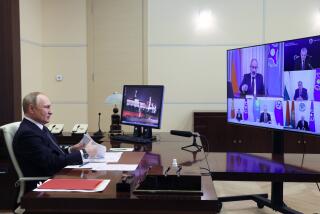Gorbachev Summons Rival Ethnic Groups to Moscow
- Share via
MOSCOW — Soviet leader Mikhail S. Gorbachev said today that leaders of the rival Armenian and Azerbaijani communities are being invited to Moscow for talks in an effort to calm ethnic unrest in the Caucasus.
Gorbachev, in his first public comment on the ethnic unrest, said his perestroika reform policies are allowing the people to give expression to an old problem that he said can only be resolved by cooperation.
Gorbachev spoke in an interview with French television in connection with a visit by French President Francois Mitterrand, who sat next to him.
Asked about the latest rioting in the two Soviet republics in which at least five people have been killed and 126 injured, Gorbachev replied:
“You know, it’s part of perestroika (restructuring). . . . Glasnost (openness) and perestroika have permitted the people to express their opinions on their well-being and on problems that have accumulated over the years.”
Two people were killed in separate incidents today as ethnic violence spread from largely Muslim Azerbaijan to traditionally Christian Armenia.
A dusk-to-dawn curfew was clamped on the Armenian capital of Yerevan, and troops and armored personnel carriers were stationed on the streets.
Gorbachev did not talk about the casualties or the emergency measures.
Meanwhile, Armenian legislators today rejected political changes sought by Gorbachev and demanded annexation of a part of Azerbaijan, residents said.
The legal status of the decisions made by about 200 of Armenia’s 340 Supreme Soviet members was uncertain, but Armenian activists called the session a victory for democracy. Residents said the legislators met in their capital’s Opera Theater until 2 a.m. today.
Rafael Popoyan, an Armenian activist, said the deputies again demanded unification of Nagorno-Karabakh with Armenia and rejected the constitutional changes proposed by Gorbachev.
Gorbachev’s amendments have provoked strong criticism, especially in the Baltic republics.
More to Read
Sign up for Essential California
The most important California stories and recommendations in your inbox every morning.
You may occasionally receive promotional content from the Los Angeles Times.










